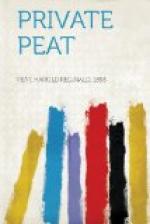Behind the old house where I lay there was a battery of British guns, 4.7’s. After a while the enemy found the range, and their shells commenced bursting round me. God in Heaven! I died a hundred deaths in that old ruin. Once a shell hit what roof there was and a score of bricks came crashing about me. Not one touched. I seemed charmed. I could hear the shells screeching through the air a second before they burst near where I lay. Of bodily pain I had little. The discomfort was great; the thirst was appalling. I thought I should bleed to death before help reached me. But there was nothing to compare with the mental strain of waiting—waiting—waiting for a shell to burst. Where would it drop? Would the next get me?
I hoped and longed and waited, but help did not come. I never lost consciousness. Darkness came and dawn. Another day went by and the shelling went on as before. Another night, another dawn and then two Highland stretcher-bearers came in. They raised me gently. The bleeding had stopped, but that journey on the stretcher was too much. I had been found and I let myself drift into the land of unknown things.
I woke before we reached a dugout dressing station. Here I was given a first-aid dressing and immediately after carried away to an old-fashioned village behind the lines. At this point there was a rough field hospital, an old barn probably. There were eighty or ninety wounded there when I arrived. Among the many French and British were some Germans. The very next stretcher to me was occupied by one of the enemy.
The Red Cross floated over the building, but that emblem of mercy made no difference to the Hun. The shells commenced to find range, and in a short time the roof was lifted off. A wounded man died close to me. I can only remember the purr of a motor as an ambulance rushed up. Then I saw four stretcher-bearers; two grabbed the German, and two caught hold of me. We were rushed to the ambulance and driven at maddening speed through the shell-ridden town.
Though I was barely conscious, though I believed that I was nearing my last moments, I remember how it struck me vividly,—the contrast in the methods of fighting. German shells were blasting to pieces the shelter of wounded men and nurses. German wounded were being cared for by those whom their comrades sought to kill. The Hun might have killed his own. It did not matter. What is a life here or there to a Hohenzollern? And the Allies—here were two British stretcher-bearers bent under the burden of an enemy patient. They were striving to save his life from the fire of his own people.
I do not remember any more after I was put in the ambulance. I came to myself in a base hospital in France. I was strapped to a water bed. Everything round me was soft and fresh and clean, and smelled deliciously. There was a patient, sweet-smiling woman in nurse’s costume who came and went to the beck and call of every man of us. We were whimpering and peevish; we were wracked with pain and weary of mind, but that nurse never failed to smile. Call a hundred times, call her once, she was always there to soothe, to help, to sympathize, and always smiling. Her heart must have been breaking at times, but her serene face never showed her sorrow or her weariness.




